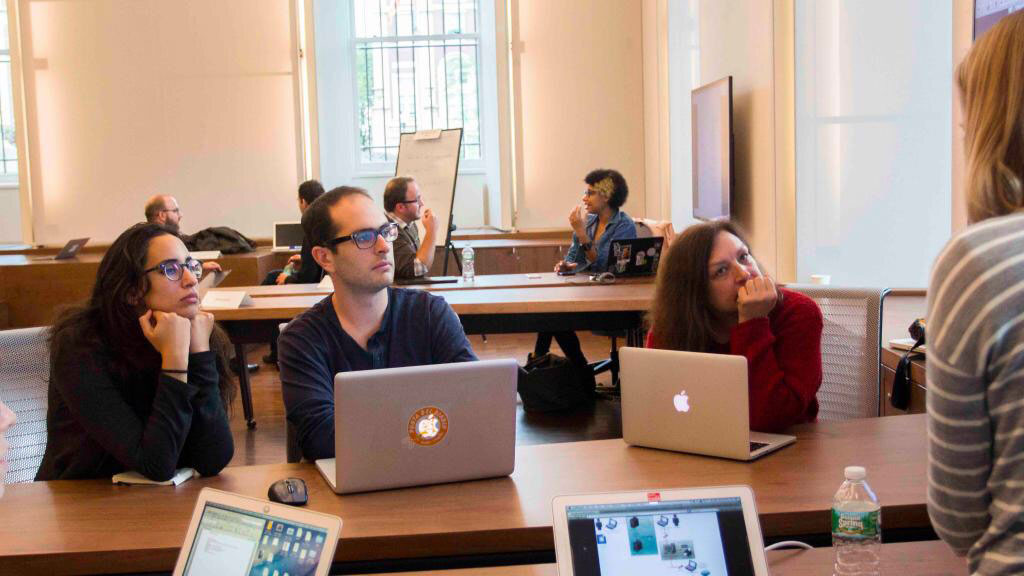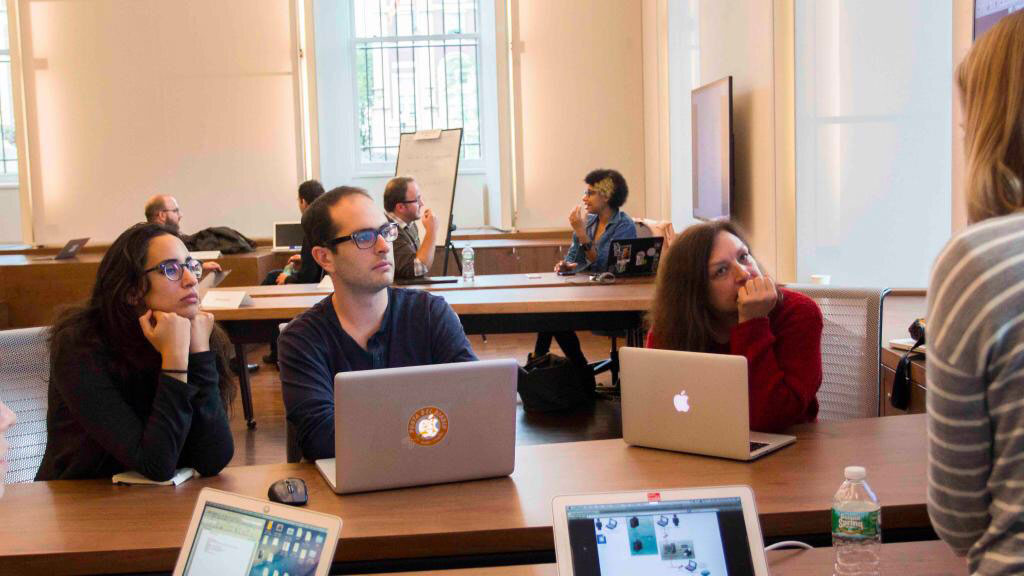
Journalism After Snowden: Protecting press freedom in the age of digital surveillance
Knight Foundation supports the Journalism After Snowden initiative to ensure access to information and promote journalistic excellence. Below, Jennifer Henrichsen, a research fellow at the Tow Center for Digital Journalism at Columbia Journalism School, and Taylor Owen, research director, write about the program. Photo: Columbia Journalism School Dean Steve Coll delivers a Journalism After Snowden lecture at Yale Law School in October. Courtesy Tow Center for Digital Journalism.
A year ago the Tow Center for Digital Journalism began working on a project exploring the implications of increased state surveillance on the practice of journalism. Funded by The Tow Foundation and Knight Foundation, Journalism After Snowden explored some of the challenges faced by journalists in an age of mass state surveillance and big data. Related LinkS
“Columbia University’s Journalism After Snowden initiative expands with new funding” press release, 6/20/2014.
“Tow Center program defends journalism from the threat of mass surveillance” by Jennifer Henrichsen and Taylor Owen, 6/20/2014
The initiative formally concludes today at an event at the Newseum in Washington, D.C., which will feature the launch and discussion of a survey of investigative journalists and their digital security practices in collaboration with Pew Research Center. We’re also hosting a conversation on surveillance and journalism with editors, academics and journalists, including New York Times Executive Editor Dean Baquet, Washington Post Executive Editor Marty Baron, Columbia University President Lee C. Bollinger, Columbia Journalism School Dean Steve Coll and Politico Editor Susan Glasser.
Through a series of research projects, events and teaching activities, the initiative has successfully explored the argument that journalists and news organizations must take source protection more seriously; facilitated stronger collaboration between journalists and technologists; and began to develop and test digital security curriculums to integrate into journalism school classrooms.
It also started a conversation and provided baseline data to assess the challenge that mass state surveillance poses to the free and open press. What is clear from the project and the Pew study is that the perception of being surveyed is having a tangible effect on the practice of investigative journalism in the United States.
In response to perceived surveillance, journalists have reported changes in how they share or store sensitive documents and how they communicate with colleagues and with sources. Some reporters said they felt an impact when it came to their sources’ willingness to share information. Fortunately, the majority of journalists reported that surveillance concerns have not prevented them from pursuing a story or reaching out to a particular source.
Unfortunately, since decreasing resources in the newsroom was reported as the most pressing issue facing journalists today, it seems unlikely that news organizations will expend more resources to provide digital security training to their journalists to mitigate perceived surveillance and hacking.

Digital security training at Columbia Journalism School, October 2014
This is worrisome because recent events have shown that journalists’ sources can be revealed through metadata no longer necessitating a subpoena to be issued to a journalist to testify who his or her source is.
When journalists can no longer protect their sources, we are at risk of losing a core check on institutional power. This is a fundamental challenge, as a free press holds a unique place in the American democratic system.
Despite limited resources in the newsroom, there are a number of things that can be done to address this challenge. News organizations can still encourage journalists to take advantage of free digital security training courses and workshops sponsored by credible organizations to learn how to conduct threat assessments and use encryption tools, while simultaneously having conversations internally on how best to leverage resources to provide more systematic training. Journalism schools can develop and mainstream digital security curriculums in their classrooms and nonprofit advocacy groups can continue to pressure policy makers to exercise caution when using their considerable surveillance and prosecutorial power.
This month we will launch an online library of instructional tools, including videos, so journalists have a permanent resource to help them better protect their data and sources. We’ll also be releasing a sample curriculum, compiled by part-time research fellows Chris Walker and Carol Waters, with concrete examples of exercises and evaluations that could be readily adopted by any school or newsroom wishing to implement a digital security training module.
Finally, we have a book due out later this year with Columbia University Press titled “Journalism After Snowden,” which includes essays on the implications of surveillance on the practice and societal role of journalism. It features chapters by Jill Abramson, Julia Angwin, Steve Coll, Susan Crawford, Ron Deibert, Siobhan Gorman, Glenn Greenwald, Eben Moglen, Alan Rusbridger, David Sanger, David Schulz, Clay Shirky, Cass Sunstein, Trevor Timm, and Ethan Zuckerman.
Although much more work needs to be done, we very much hope that this research, the events we have held across the country, and the forthcoming book, will further this critical conversation.
The Journalism After Snowden closing event takes place from 4:30 to 7:45 p.m. ET Thursday, Feb. 5, at the Newseum in Washington, D.C. Watch via live stream on J-School Live.
Recent Content
-
Journalismarticle ·
-
Journalismarticle ·
-
Journalismarticle ·


